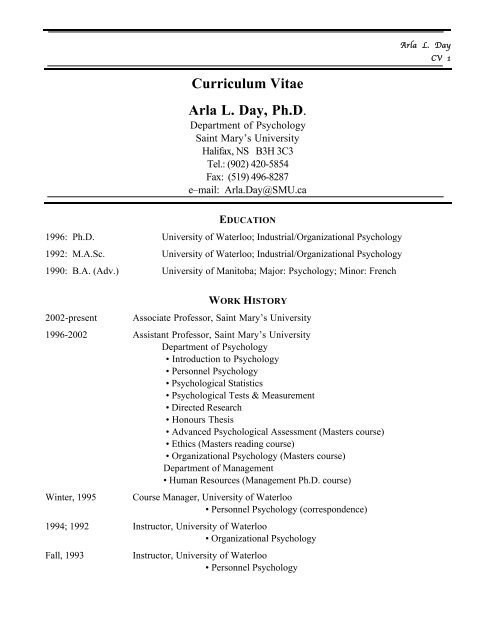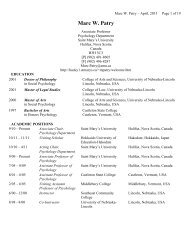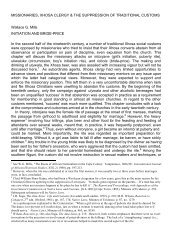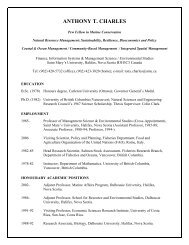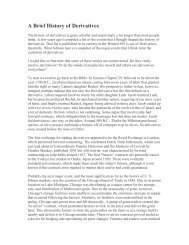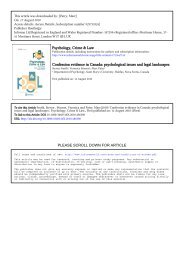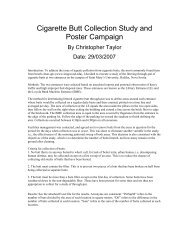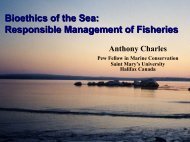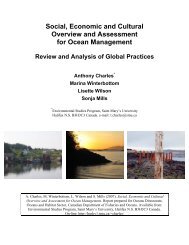Dr. Arla Day's CV. - Saint Mary's University
Dr. Arla Day's CV. - Saint Mary's University
Dr. Arla Day's CV. - Saint Mary's University
- No tags were found...
You also want an ePaper? Increase the reach of your titles
YUMPU automatically turns print PDFs into web optimized ePapers that Google loves.
<strong>Arla</strong> L. Day<strong>CV</strong> 1Curriculum Vitae<strong>Arla</strong> L. Day, Ph.D.Department of Psychology<strong>Saint</strong> Mary’s <strong>University</strong>Halifax, NS B3H 3C3Tel.: (902) 420-5854Fax: (519) 496-8287e–mail: <strong>Arla</strong>.Day@SMU.caEDUCATION1996: Ph.D. <strong>University</strong> of Waterloo; Industrial/Organizational Psychology1992: M.A.Sc. <strong>University</strong> of Waterloo; Industrial/Organizational Psychology1990: B.A. (Adv.) <strong>University</strong> of Manitoba; Major: Psychology; Minor: French2002-presentWORK HISTORYAssociate Professor, <strong>Saint</strong> Mary’s <strong>University</strong>1996-2002 Assistant Professor, <strong>Saint</strong> Mary’s <strong>University</strong>Department of Psychology• Introduction to Psychology• Personnel Psychology• Psychological Statistics• Psychological Tests & Measurement• Directed Research• Honours Thesis• Advanced Psychological Assessment (Masters course)• Ethics (Masters reading course)• Organizational Psychology (Masters course)Department of Management• Human Resources (Management Ph.D. course)Winter, 1995Course Manager, <strong>University</strong> of Waterloo• Personnel Psychology (correspondence)1994; 1992 Instructor, <strong>University</strong> of Waterloo• Organizational PsychologyFall, 1993Instructor, <strong>University</strong> of Waterloo• Personnel Psychology
<strong>Arla</strong> L. Day<strong>CV</strong> 2REFEREED PUBLICATIONSDay, A.L. (in press). Defining and Measuring Emotional Intelligence (EI): Making Sense of the EILiterature. In G. Geher (Ed). Emotional Intelligence: Measurement and Application.Day, A.L. & Kelloway, E.K. (in press). Emotional Intelligence in the Workplace: Rhetoric and Reality. InG. Geher (Ed). Emotional Intelligence: Measurement and Application.Inness, M., Desmarais, S., & Day, A. (in press). Gender, mood state, and justice preference: Do moodstates moderate gender-based norms of justice? British Journal of Social Psychology.Day, A. L. & Carroll, S. (2004). Using an ability-based measure of emotional intelligence to predictindividual performance, group performance, and group citizenship behaviours. Personality andIndividual Differences, 36, 1443-1458.Day, A. L. & Carroll, S. (2003). Situational and patterned behavior description interviews: Acomparison of their validity, correlates, and perceived fairness. Human Performance, 16(1), 25-47.Day, A. L. & Livingstone, H. (2003). Gender, stress, and the utilization of social support. CanadianJournal of Behavioural Sciences, 35(2), 73-83.Day, A. L. & Jreige, S. (2002). Using Type A Behavior Pattern to explain the relationship between jobstressors and psychosocial outcomes. Journal of Occupational Health Psychology, 7(2), 109-120.Day, A. L. & Livingstone, H. (2001). Chronic and acute stressors among military personnel: Do copingstyles buffer their negative impact on health? Journal of Occupational Health Psychology, 6(4).Newsome, S., Day, A. L., & Catano, V.M. (2000). The incremental validity of emotional intelligence.Personality and Individual Differences, 29(6), 1005-1016.Day, A. L. & Colwill, N. L. (1995). Work and the family. In S. Vinnicombe & N. L. Colwill (Eds.)The Essence of Women in Management. Toronto, ON: Prentice Hall, Inc.Rowe, P.M., Williams, M. C., & Day, A. L. (1994). Selection procedures in North America.International Journal of Selection and Assessment, 2(2), 74–79.UNDER REVISIONMANUSCRIPTS UNDER REVISION, UNDER REVIEW, & IN PREPARATIONLivingstone, H. & Day, A. L. (under revision). Comparing the construct and criterion-related validity ofability-based and mixed-model measures of emotional intelligence. Educational and PsychologicalMeasurement.UNDER REVIEWDay, A. L. & Chamberlain, T. (under review). Committing to your work, spouse, and children:Implications for work-family conflict. Journal of Vocational Behavior.
<strong>Arla</strong> L. DayDay, A.L., Therrien, D., & Carroll, S. A. (under review). Using daily hassles, personality, and emotionalintelligence to predict strain. European Journal of Psychology.<strong>CV</strong> 3IN PREPARATIONDay, A. L. & Carroll, S. A. (manuscript in preparation). Faking emotional intelligence tests:Implications for selection.Day, A. L, Livingstone, H. A., Carroll, S. A. (manuscript in preparation). Parent-role guilt, timecommitments, and psychosocial outcomes.Day, A. L., Parker, G., & Keyes, H. (manuscript in preparation). An examination of the sources andtypes of social support.Day, A. L., Stinson, V., & Catano, V. M. (manuscript in preparation). Stress and strain in third partiesof strike actions.Dupre, K. & Day, A.L. (manuscript in preparation). Beyond job satisfaction: Examining the antecedentsof turnover.TECHNICAL & CONSULTING REPORTSDay, A., Newsome, S., Catano, V. M., Guerbilsky, E., & Hong, Y. (2004). Multi-rater assessment andfeedback: Developing leadership competencies. Sponsored Research Report: Canadian ForcesLeadership Institute, Kingston, ON.Newsome, S., Day, A. L., Smithers, S., & Hartley, C. (2004). Compendium of Leadership AssessmentInstruments. Sponsored Research Report: Canadian Forces Leadership Institute, Kingston, ON.Kelloway, E. K., Francis, L., Catano, V. M., Cameron, J. E., Day, A. L. (2004). Psychological disordersin the CF: Legal and Social Issues. Contractor’s Report 2004-01; Director Human ResourcesResearch and Evaluation, National Defence Headquaters, Major-General George R. PearkesBuilding, Ottawa, ON.Jones, D. A., Carroll, S. A., & Day, A. L. (2003). Perceptions of Leadership Fairness in the CanadianForces: Unintended Consequences of Leader Behaviour and Transmission of Core Values.Sponsored Research Report: Canadian Forces Leadership Institute, Kingston, ON.Newsome, S., Catano, V. M. & Day, A. L. (2003). Leader Competencies: Proposing a ResearchFramework. Sponsored Research Report: Canadian Forces Leadership Institute, Kingston, ON.Day, A. L. (2002). Development of recruitment and staffing exam questions for Human ResourcesProfessionals. Report prepared for the Canadian Council of Human Resources Associations.Day, A. L. Newsome, S., & Catano, V. M. (2002). Emotional Intelligence and Leadership. Prepared forthe Canadian Forces Leadership Institute. Department of National Defense.Newsome, S. Day, A. L., & Catano, V. M. (2002). Leader Assessment, Evaluation and Development.Prepared for the Canadian Forces Leadership Institute. Department of National Defense.
<strong>Arla</strong> L. DayStinson, V., Day, A. L., Cameron, J. E., & Catano, V., M. (2002). Subgroup Issues and Leadership.Prepared for the Canadian Forces Leadership Institute. Department of National Defense.Day, A. L. (2001). Review of the tasks and knowledge required for Human Resources Professionals.Report prepared for the Canadian Council of Human Resources Associations, Ottawa, ON.Day, A. L., Stinson, V., & Catano, V. M. (2001). Diversity and culture change within organizations.Report prepared for the Directorate of Naval Personnel Requirements, Department of NationalDefence.Hill, T. & Day, A. L. (2000). Quality of Life Survey Report. Research report for the Nova ScotiaDepartment of Labour, Halifax, NS.Catano, V. M., Day, A. L., & Adams-Roy, J. (1999). Change and renewal in the DND: Results of the1999 D2000 Survey. Sponsored research report 99-16, Ottawa: Director of Human Resources,Research, and Evaluation.Day, A. L., Methot, L. L., & Stinson, V. (1997). Linking ABLE/AIM to theory. Technical Report - 97:Department of National Defence, Ottawa, ON.Methot, L. L., Stinson, V., & Day, A. L. (1997). Review of the ABLE and AIM. Sponsor ResearchReport - 97: Department of National Defence, Ottawa, ON.Day, A. L. (1993). Internal and External Needs Analysis. Report prepared for the Institute forImproved Quality and Productivity, Waterloo, ON.Day, A. L. (1991). Employment Equity Report. Report prepared for the Human ResourcesDepartment, Corporation of the City of Cambridge, ON.<strong>CV</strong> 4INVITED ARTICLESNewsome, S. & Day, A. L. (2001). Would the real emotional intelligence please stand up? TheCanadian Industrial and Organizational Psychologist, 17(4), 8-10.Day, A. L. (2000). I/O…I/O…It’s off to work we go… Guest editorial introduction. Nova ScotiaPsychologist: Special Issue on Industrial/Organizational Psychology, 13(1).Day, A. L. (2000). I/O Psychology…at SMU… across Nova Scotia…and in Canada. Nova ScotiaPsychologist: Special Issue on Industrial/Organizational Psychology, 13(1).Johns, G. & Day, A. L. (2000). 25 th anniversary of CSIOP…and still going strong! Psynopsis, 22(3), 8.Day, A. L. & Johns, G. (2000). <strong>Dr</strong>. Pat Rowe receives Distinguished Contributions to I-O PsychologyAward. Psynopsis, 22(3), 8.Day, A. L. & Colwill, N. L. (1992). Pay equity in Manitoba: Attitudes of management students.Women in Management, 2(4), 3.
<strong>Arla</strong> L. Day<strong>CV</strong> 5PRESENTATIONS & POSTERSDay, A. L. (2004). The reciprocal relationship between safety, performance, and employee well-being:Themes and suggestions. Presentation at the annual meeting of the American PsychologicalAssociation, Honolulu, Hawaii, July 28 – August 1.Day, A. L. (2004). Assessing Leadership in the Canadian Forces. Symposium at the annual meeting ofthe Canadian Psychological Association, St. Johns, NF, June 12.Day, A. L. (2004). Cutting-Edge Constructs in I/O Psychology. Symposium at the annual meeting of theCanadian Psychological Association, St. Johns, NF, June 12.Day, A. L., Paquet, S., Hambley, L., Lucas, C., & Borodenko, N. (2004). Impact of informationtechnology stressors on employee strain outcomes. Presentation at the annual meeting of theSociety of Industrial & Organizational Psychology, Chicago, IL, April 15.Carroll, S. A. & Day, A. L. (2004). Faking emotional intelligence: Comparing response distortion onability and mixed-model measures. Presentation at the annual meeting of the Academy ofManagement, New Orleans, LA, August 10.Day, A. L. & Ziemer, K. (2003). Subjective and objective measures of task control and stress.Presentation at the annual meeting of the Administrative Sciences Association of Canada, Halifax,NS, June 16.Carroll, S. Lee, K. Day, A. L., & Piasentin, K. (2003). Influence of supervisor personality on employeewell-being and strain outcomes. Presentation at the annual meeting of the Canadian PsychologicalAssociation, Hamilton, ON, June 13.Day, A. L. (2003). New directions in occupational stress research. Symposium Moderator. The annualmeeting of the Canadian Psychological Association, Hamilton, ON, June 13.Paquet, S., Day, A. L., Lucas, C., Hambley, L. & Borodenko, N. (2003). Assessing workplacetechnological stressors: Development and validation of the Information Technology StressorScale. The annual meeting of the Canadian Psychological Association, Hamilton, ON, June 13.Sulsky, L., Day, A. L., & Ferris, P. (2003). Fear vs. frustration: Examining employee’s reactions toorganizational stressors. Presentation at the annual meeting of the Canadian PsychologicalAssociation, Hamilton, ON, June 13, 2003.Day, A. L., Stinson, V., Cameron, J., & Catano, V. M. (2002). Leadership, groups, & diversity:Implications for organizational effectiveness? The annual meeting of the International <strong>University</strong>Seminar, Kingston, ON, October 26.Day, A. L. (2002). Emotional Intelligence: Fad, fashion, or fact? The annual meeting of the CanadianPsychological Association, Vancouver, BC, June 1.Day, A. L. (2002). Where the rhetoric meets the road: The need for evidence-based practice in I/Opsychology. Symposium moderator: The annual meeting of the Canadian PsychologicalAssociation, Vancouver, BC, June 1.
<strong>Arla</strong> L. DayDay, A. L., Stinson, V., & Catano, V. M. (2002). Strike Threats: Predictors of Strain Outcomes inAffected Third Parties. The annual meeting of the Society of Industrial and OrganizationalPsychology, Toronto, ON, April 13.Day, A. L. & Therrien, D. (2002). Using “Emotional Intelligence” to predict psychological health:Implementing a new construct or re-inventing the wheel?. The annual meeting of theAdministrative Sciences Association of Canada, Winnipeg, MB, May 26.Day, A. L. (2001). Coping with organizational downsizing and mergers. Symposium moderator: The10th European Congress on Work and Organizational Psychology. Prague, The Czech Republic,May 17.Day, A. L. & Hill, T. (2001). Employee reactions during times of uncertainty and downsizing.Presentation at the 10th European Congress on Work and Organizational Psychology. Prague,The Czech Republic, May 17.Carroll, S. & Day, A. L. (2001). Examination of an Ability-Based Measure of Emotional Intelligence.Paper presented at the annual meeting of the Canadian Psychological Association, Quebec City,QC, June 23.Day, A. L. (2001). Job Satisfaction & Well-being: Concepts and correlates. Symposium moderator: Theannual meeting of the Canadian Psychological Association, Quebec City, QC, June 23.Hill, T. & Day, A. L. (2001). Investigating job satisfaction in triplicate: Organizational factors, jobcharacteristics, and personality. Presentation at the annual meeting of the Canadian PsychologicalAssociation, Quebec City, QC, June 23.<strong>CV</strong> 6Livingstone, H. & Day, A. L. (2001). The role of emotional intelligence as a predictor of job satisfaction.Presentation at the annual meeting of the Canadian Psychological Association, Quebec City, QC,June 23.Adams-Roy, J., Catano, V. M., & Day, A. L. (2000). Can it be done? Longitudinal results of anorganizational change and renewal program. Presentation at the annual meeting of the CanadianPsychological Association, Ottawa, ON, June 30.Day, A. L. (2000). The employment interview: Issues of construct and predictive validity. Symposiummoderator: The annual meeting of the Canadian Psychological Association, Ottawa, ON. June 30.Carroll, S. & Day, A. L. (2000). Performance on the selection interview: Examining its predictors andpredictive validity. Presentation at the annual meeting of the Canadian Psychological Association,Ottawa, ON, June 30.Day, A. L. & Livingstone, H. (2000). Acute and chronic job stressors: Does coping style buffer theirnegative outcomes? Paper presented at the Society of Industrial and Organizational PsychologyConference, New Orleans, LA, April 15.Day, A. L. (1999). Committing to your work, spouse, and children: Does role commitment exacerbateor alleviate work-family conflict? Paper presented at the Third Australian Industrial andOrganisational Psychology Conference, Brisbane, Australia, June 26-27.
Day, A. L. (1999). Work, Family, and Well-Being: An individual and Organizational Approach toStressors, Stress, and Coping. Symposium moderator: The annual meeting of the CanadianPsychological Association, Halifax, NS, May 21.<strong>Arla</strong> L. DayDupré, K. E. & Day, A. L. (1999). The psychosocial and organizational impact of family and income inthe Canadian Forces. Presentation at the annual meeting of the Canadian PsychologicalAssociation, Halifax, NS, May 21.Dyous, C. & Day, A. L. (1999). Guilt & parenthood: How does parent-role guilt impact onpsychological outcomes. Presentation at the annual meeting of the Canadian PsychologicalAssociation, Halifax, NS, May 21.Jreige, S. & Day, A. L. (1999). Examining indicates of well-being: The predictive ability of Type ABehaviour Pattern. Presentation at the annual meeting of the Canadian Psychological Association,Halifax, NS, May 21.Livingstone, H. A. & Day, A. L. (1999). Stressors and social support: Do women and perceive themsimilarly? Presentation at the annual meeting of the Canadian Psychological Association, Halifax,NS, May 21.Day, A. L. (1998). Out of time!: The impact of work and non-work time commitments on feelings ofconflict and strain. Presentation at the annual meeting of the Administrative Sciences Associationof Canada, Saskatoon, SK, June.Day, A. L., Parker, G., & Keyes, H. (1998). Conceptualizing social support: Are the outcomes ofsupport role specific? Paper presented at the annual meeting of the Canadian PsychologicalAssociation, Edmonton, AB, June.Day, A. L. (1997). Examining the antecedents of work-spouse and work-parent conflict. Paperpresented at the annual meeting of the Canadian Psychological Association, Toronto, ON.Day, A. L. (1997). Predicting work-spouse and work-parent conflict using incompatible behaviourexpectations. Presentation at the annual meeting of the Administrative Sciences Association ofCanada, St. John's.Day, A. L. (1993). A path analysis model of pay satisfaction. Paper presented at the annual meeting ofthe Canadian Psychological Association, Montreal, QC.Day, A. L. (1990). Attitudes towards pay equity among human resource management students. Paperpresented at the annual meeting of the Canadian Psychological Association, Ottawa, ON.INVITED PRESENTATIONS & LECTURESDay, A. L. (2002). The Emotional Intelligence Extravaganza. <strong>University</strong> of Calgary I/O PsychologyGroup Brown Bag meetings, December 6, Calgary, AB.Day, A. L. (2001). Emotional Intelligence in the Workplace: Effective HR Tool or Fad? Invitedpresentation for the Federal Government Human Resource Professionals in Nova Scotia,November 26, Dartmouth, NS.<strong>CV</strong> 7
<strong>Arla</strong> L. DayHill, T. & Day, A. L. (2000). Morale & Quality of Life Survey. Presentation for the Occupational Health& Safety Division of the Nova Scotia Department of Labour, May 17, Halifax, NS.Day, A. L. & Carroll, S. (2000). Understanding the selection interview. Invited presentation for theMeeting of Military Personnel Selection Officers, February 25, Halifax, NS.Day, A. L. (1999). Applying to Graduate School. Invited workshop for the <strong>Saint</strong> Mary’s PsychologyStudent Conference, April, Halifax, NS.Day, A. L. (1999). Work stress, conflict, and police officers. Invited Lecture: Criminology GraduateSeminar, <strong>Saint</strong> Mary’s <strong>University</strong>, Halifax, NS.Day, A. L. (1998). An Academic’s Life: Why Choose a Career in Academia? Invited workshop for the<strong>Saint</strong> Mary’s Psychology Student Conference, March, Halifax, NS.Day, A. L. (1998). I get by with a little help from my friends...& partner, ...& family, ...& coworkers:The relationship among social support, work-family conflict, and well-being. Presentation for theColloquium Series: Department of Psychology, Dalhousie <strong>University</strong>: Halifax, NS.Day, A. L. (1997). The impact of time, strain, and behaviour on work-family conflict. Presentation forthe Colloquium Series, Department of Psychology, Acadia <strong>University</strong>, Wolfville, NS.<strong>CV</strong> 8REVIEWS OF PAPERS, PRESENTATIONS, BOOKS, AND GRANT APPLICATIONS1997 to present Journal Article Reviews:• Canadian Journal of Administrative Sciences• Canadian Journal of Behavioural Sciences• Canadian Psychology• Journal of Occupational & Organizational Psychology• Journal of Occupational Health Psychology• Personality and Individual Differences1997 to present Conference Paper/Presentation Reviews:• Administrative Sciences Association of Canada Annual Conference:Organizational Behaviour Division; Women in Management Division• Atlantic Schools of Business Annual Conference: OB Division• Canadian Psychological Association: CSIOP Division• Society for Industrial & Organizational Psychology1998 to present Book Reviews:• Introduction to Psychology (Wood et al., 1999, Allyn & Bacon)• Research, Measurement, and Evaluation of Human Resources; Nelson Canada• Organizational Stress & Stress Management (in press)• Organizational Behaviour (Nelson Canada)2003 Grant Application Reviewer: NIH – B/START.2002- 2003 Grant Application Reviewer: SSHRC.
2002 Conference Reviewer: APA/NIOSH Work, Stress, & Health ConferenceDecember , 2001December, 2001External Reviewer: Tenure & Promotion Application<strong>Arla</strong> L. DayGrant Application Reviewer: Fonds québecois de la récherche sur la nature et lestechnologies (formerly Fonds FCAR).<strong>CV</strong> 9GRANTS & AWARDSNova Scotia Health Research Foundation: September, 2004: $9,983.00Principal Applicant• Familes with special needs children: Minimizing the psychosocial stress and strain of workfamilyconflictHealth Canada: July, 2004: $259,450.00Co-Applicant• Building Quality Healthcare Workplaces: Nurses as knowledge sharers in Atlantic CanadaFoundation for Air Medical Research:December, 2002: $6500.00 (US).Co-Applicant• Occupational Injuries and Stressors Among Canadian Air Medical Healthcare Professionals inRotor-Wing ProgramsNova Scotia Health Research Foundation: April, 2002: $4300.00• Organizational Stress Research Mentoring Funding<strong>Saint</strong> Mary’s Faculty of Graduate Studies Grants: <strong>Saint</strong> Mary’s <strong>University</strong>, 2002-present<strong>Saint</strong> Mary’s Senate Research Grants: <strong>Saint</strong> Mary’s <strong>University</strong>, 1997-2002SSHRC Institutional Grant for New Faculty: <strong>Saint</strong> Mary’s <strong>University</strong>, 1999-2001SSHRC Doctoral Scholarship: <strong>University</strong> of Waterloo, 1994 - 1996Ontario Graduate Scholarship: <strong>University</strong> of Waterloo, 1993 – 1994U of W Graduate Scholarship: <strong>University</strong> of Waterloo, 1990 – 1993<strong>University</strong> Gold Medal: <strong>University</strong> of Manitoba, 1990Chown Centennial Award: <strong>University</strong> of Manitoba, 1986STUDENT SUPERVISIONMasters’ theses, Department of Psychology, <strong>Saint</strong> Mary’s <strong>University</strong>• Sonya Melnyk (in progress). Work and family responsibilities and job stress.• Fraser Boyes (in progress). The criterion-related validity of personality in the military.• Diane Kilby (in progress). Turnover in the military.• Marie Norris (2004). Retention and turnover intentions in the Canadian military.• Theresa Hill (2002). Morale, satisfaction, and organizational citizenship behaviours.
<strong>Arla</strong> L. Day<strong>CV</strong> 10• Holly Livingstone (2001). Emotional intelligence in relationship to work and non-work outcomes inthe Canadian Forces. Defended September, 2001.• Kate Dupré (1999). The individual and organizational predictors of work satisfaction, turnoverintentions, and health symptoms in the Canadian Forces. Defended September, 1999.Executive Masters’ of Business Administration theses, <strong>Saint</strong> Mary’s <strong>University</strong>• Roland King (2003). Using emotional intelligence, personality, empathy, and self-monitoring abilityto predict performance in school administrators. Presented April 10, 2003.Honours’ theses, Department of Psychology, <strong>Saint</strong> Mary’s <strong>University</strong>• Sarah Crown (2004). Chronic and Acute Stressors: Their association with personality variables andstress outcomes.• Katie Ziemer (2003). Examining Job Stress: Subjective and Objective Indices of the Stress Process.• Delinda Therrien (2001). Personality and emotional intelligence as predictors of strain outcomes.• Sarah Carroll (2000). The predictive validity of structured interviews: Situational vs. PatternedBehaviour Description Interviews.• Holly Livingstone (1999). Gender differences in perception of stressors and utilization of socialsupport.• Lesley Burke (1998). The outcomes of group work and feedback on individual attitude and wellbeingmeasures.• Steve Jreige (1998). The relationship among Type A Behaviour Pattern, work stressors, andpsychosocial outcomes.• Heather Keyes (1997). Gender differences in social support, work-family conflict, and satisfaction.• Gillian Parker (1997). The relationship among work-family conflict, support, and well-being.Honours’ thesis (Co–Supervisor), Department of Psychology, <strong>University</strong> of Waterloo• Siobhan Lydon (1996). Gender differences in procedural and distributive justice.Independent Research Projects, Department of Psychology, <strong>Saint</strong> Mary’s <strong>University</strong>• Jason Satel (1999). Occupational Stress.• Marie Jones (1998). A comparison of the levels of social support and conflict between dual-careerand single-career families.• Siew Fang Law (1998). Work-family conflict in a Malaysian culture.M.Sc. Thesis Defense Committees.• Trina Chamberlain (2004). Personality and a new Canadian Dental Association interview:Implications for dental student selection.
<strong>Arla</strong> L. Day• Sebastien Blanc (September, 2003). Naval officer selection in Canada: An evaluation of theMaritime Officer Selection Test (MOST).• Sarah Campell (May 2001). Investigating the use of alternate predictors of training performance inthe Canadian Forces Operator occupations.STUDENT EMPLOYMENT GRANTS1998 - 2004 Student Employment Experience Program: I have supported 14 researchassistants & project managers over the past 5 years1998/1999 Nova Scotia Links Program: Hired research project manager<strong>CV</strong> 11UNIVERSITY & DEPARTMENTAL ACTIVITIES2003 to present Graduate Program Coordinator, Department of Psychology, <strong>Saint</strong> Mary’s U.2002 to present Founding board member: CN Centre for Occupational Health & Safety2002 to present Founding board member: Centre for Leadership Effectiveness2001 - 2002 Member: Course Evaluations Committee2000 to 2002 Vice-Chair: Research Ethics Board; <strong>Saint</strong> Mary’s <strong>University</strong>1999 - 2000 Chair & Organizer, APICS Psychology Conference 2000, SMU1998 to 2002 Chair & Organizer, <strong>Saint</strong> Mary’s Psychology Student Conference1999 to 2000 Chair, Psychology Ethics Committee; <strong>Saint</strong> <strong>Mary's</strong> <strong>University</strong>1999 to 2002 Graduate Program Co-Coordinator; Psychology Dept., SMU1999 to 2002 Convocation Committee Member1999 to 2002 Graduate Committee Member1998 to 2000 Acting APICS Representative (for SMU Psychology Department)1998 to 2001 Academic Planning Committee, <strong>Saint</strong> Mary’s <strong>University</strong>1998 to 2001 Union Observer1997 to 2002 Colloquia Co-Organizer; Psychology Dept., <strong>Saint</strong> <strong>Mary's</strong> <strong>University</strong>June 1997 Acting Department Chair; Psychology Dept., <strong>Saint</strong> <strong>Mary's</strong> <strong>University</strong>1996 to 2002 Undergraduate Workshop Co-Coordinator & Presenter1996 to 2002 Graduate Teaching Assistant Workshop Co-coordinator & Presenter1996 to 1999 Acting Coordinator of Graduate Internships, Psychology Dept., SMU1996 to 1999 Psychology Ethics Committee; <strong>Saint</strong> <strong>Mary's</strong> <strong>University</strong>
1994 to 1995 Mass Testing Coordinator, Psychology Dept., <strong>University</strong> of Waterloo1994 T.A. Workshop Committee, Psychology Dept., <strong>University</strong> of Waterloo• Developed Training Program, Manual, and Evaluation Form1993 Computer Committee, Psychology Dept., <strong>University</strong> of Waterloo• Designed Computer Usage Requirements Questionnaire2004-presentPROFESSIONAL ACTIVITIES<strong>Arla</strong> L. DayChair; APA Business of Practice Network: Psychological Healthy WorkplaceAward Committee; Nova Scotia.2002-2004 Research Associate: Canadian Forces Leadership Institute2002-2003 Visiting Scholar, Department of Psychology, <strong>University</strong> of Calgary2002-2003 Chair, Canadian Society for Industrial/Organizational Psychology (CSIOP)2002-2003 Visiting Scholar: <strong>University</strong> of Calgary, I/O Psychology Department2002-2003 Personnel Psychometrics Workshops: DND Directorate of Human ResourcesResearch & Evaluation2002 RHR-Kendall Award Selection Committee Member, CSIOP2001-2003 Consultant: Canadian Forces Leadership Institute• Reviewed the leadership literature and prepared research reports2001-2002 Chair Elect, CSIOP<strong>CV</strong> 122001 Consultant: Canadian Council of Human Resources Associations• Developed matrix for the tasks and knowledge required for HR professionals2000 to present Columnist: The Canadian Industrial & Organizational Psychologist2000 Consultant: Canadian Forces Culture and Diversity Project• Prepared research report: Recommendations for organizational culture change& diversity.2000 Project Manager: Employee survey (data management, coding, & entry)• Supervised students and coded, entered, and managed a large database.2000 Consultant: Nova Scotia Government Survey of IT Practices• Supervised graduate students as they analyzed & presented survey results2000 Guest Editor, The Nova Scotia Psychologist: Special Issue onIndustrial/Organizational Psychology, 13(1). Association of Psychologists inNova Scotia.2000 Canadian Psychological Association Annual Conference• Organized ceremony for Distinguished Scientist Award Recipient.
2000 Canadian Psychological Association Annual Conference• Panel member: Collaboration between CSIOP & HR.com2000 Chair, RHR-Kendall Award Selection Committee, CSIOP• Organized and reviewed papers for the best I/O student paper award1999 to 2001 Membership Coordinator, CSIOP<strong>Arla</strong> L. Day<strong>CV</strong> 131999 Consultant: Maritime-based retail organization• Developed structured interview forms & conducted employment interviews.• Developed performance feedback forms & conducted feedback interviews.1999-2000 Consultant: Department of National Defence D2000 Member Survey• Developed survey, analyzed data, and presented report.June, 1998Discussant: ASAC Organizational Behaviour Division1997 to 1999 Secretary/Treasurer, CSIOPSpring, 1997March, 1993Consultant: Department of National Defence• Prepared report: Assessing Personality Measures for Selection TechniquesSpeaker Chair & Program Chair: Industrial/Organizational & OrganizationalBehaviour Graduate Students' Conference1992 – 1993 Research Assistant/Consultant: Institute for Improved Quality and ProductivityWinter, 1992Fall, 1991Organizational Consultant; Centre in the Square, Waterloo, ON• Helped define organizational goals and mission statementEmployment Equity Consultant/Researcher• Human Resources Department; Corporation of the City of CambridgePROFESSIONAL AFFILIATIONS• Academy of Management (1996 to 2001)• Administrative Sciences Association of Canada (1996 to 1999)• American Psychological Association (1996 to 1998)• Australian Psychological Society (1999 to 2000)• Canadian Psychological Association (1990 to present)• Canadian Society for Industrial/Organizational Psychology (1990 to present)• Society for Industrial/Organizational Psychology (1994 to present)PROFESSIONAL DEVELOPMENTAL ACTIVITIESWorkshops (attended):• Nova Scotia Health Research Foundation. Capacity Building Workshops: DevelopingCollaborative Health Research Programs. September 25-27, 2003. Halifax, NS.
<strong>Arla</strong> L. Day• Halifax Workshop on Sleep and Circadian rhythms (implications for workplace safety and shiftwork). Invited Conference. December 8 & 9, 2001, Halifax, NS.• Personality & Work Issues: M. Barrick & T. Judge. (April, 2000), SIOP Conference, NewOrleans, LA.• Honesty Testing in the Workplace; K. Murphy. (May, 2000), CPA Conference, Ottawa, ON.• Web page design course; (1999). <strong>Saint</strong> Mary’s <strong>University</strong>• Situational Judgement Tests; W. Borman. (June, 1999), AIOP Conference, Brisbane, Australia.• Personality & Selection; R. Hogan & J. Hogan. (June, 1999), AIOP Conference, Brisbane,Australia• Using PowerPoint for classroom teaching. (1998). <strong>Saint</strong> Mary’s <strong>University</strong>.<strong>CV</strong> 14


